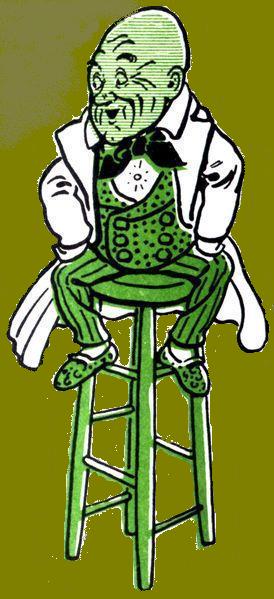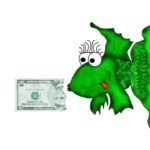Post-COVID America
Introduction
In this essay, we'll examine economic conditions prior to COVID, the ensuing financial calamity, and a look towards the future. I'll delve into methodology and potential outcomes for the Post-COVID economy. To be clear, I did not predict the COVID outbreak. There were many, many events in our recent past, and decisions by central banks and government heavily favoring the economic outcome we're experiencing and will experience. The deteriorating social mood also contributed to the outcome. Humpty Dumpty was on the wall. The virus' gentle nudge made him fall.
Throughout the essay, there will be references to books and articles offering more depth. Politics is part of the discussion, though nothing written constitutes a political endorsement. What follows is an analytical recognition of where we stand and where we're headed.
Pre-COVID Economy
 The economy did not crash because of COVID. The virus was the pin that popped the #Omnibubble. Public health policy made the pin sharper. The virus was the spark igniting combustible material. Public health policy added kerosene. This is not a judgment of policy response, but an outcome recognition. The policy response coupled with fragile markets decapitated the economy. Contrary to what you heard, this was not the strongest economy in the history of history. Reasons it was far weaker than understood include:
The economy did not crash because of COVID. The virus was the pin that popped the #Omnibubble. Public health policy made the pin sharper. The virus was the spark igniting combustible material. Public health policy added kerosene. This is not a judgment of policy response, but an outcome recognition. The policy response coupled with fragile markets decapitated the economy. Contrary to what you heard, this was not the strongest economy in the history of history. Reasons it was far weaker than understood include:
- The Wizards stretched the #Omnibubble to unfathomable dimensions attempting to "resolve" the 2008 Global Financial Crisis. They made the next crisis worse.
- The Yield Curve flashed warning signs in April 2019. I voiced further concern in November 2019. These recession harbingers.
- Stocks became the riskiest in history.
- Tesla became so overvalued, it defied the #Omnibubble.
- The federal deficit exploded with historically low interest rates, unemployment, and ostensibly, a strong economy. Why?
- September 2019, the Fed Wizards started rescuing financial institutions to the tune of billions when overnight rates spiked to 10%. This harbinger was under-reported in mainstream media since politics consumed the nation's oxygen.
- Social and political discord continued its escalation (see local & national news, Facebook, Twitter, and even Nextdoor¹.)
This was the foundation for COVID-19. Without this foundation, economic outcomes would have been different even with COVID. The economic calamity was in front of us. Only its arrival was uncertain.
Facts do not cease to exist because they're ignored - Aldous Huxley
Social Cycle Model
Cycles help us understand predictable phenomena like lunar phases, tides, or human gestation. There are cycles appearing in business and financial markets. Those cycles are less precise since humans are involved and we can exercise free will. That said, humans are subject to innate behavior, especially herding. In the absence of better information, people follow the crowd, particularly in financial markets. There is a cycle impacting human behavior and that is what I term the Saeculum.
A Saeculum comprises four generations of 20-25 years each. The Saeculum progresses through four stages, or seasons corresponding to Youth, Rising Adulthood, Midlife, and Old Age. Strauss & Howe identified generational archetypes whose behavior repeats (cycle). Their theory suggests that after each Saeculum, a crisis emerges as society passes through a changing of the generational guard. Each generation has its role during the crisis and these behaviors repeat throughout history. While their research is controversial, I've found application in economic and financial cycles.
There are several business and economic cycles ² that overlay well on the Saeculum. Business and economic cycles are reflections of social mood. Social mood progresses through a similar four-season pattern identifiable in attitudes, trends, beliefs, customs, and behaviors. The accompanying graphic illustrates this model.

Public anger, discontent, conservation, fear, distrust, nationalism, government authority, lower birth rates, and political upheaval characterize the winter season. I can trace the start of this social cycle around the year 2000. We've slowly undergone the emotional progression since. In fact, popular word searches in an online dictionary tell us how people feel. It's difficult to have a prosperous economy and buoyant stock market if we don't feel optimism. You might ask how we've achieved the level of economic and financial market "success" in the face of social discontent? For that, I refer you to the Wizards³. Their intervention created a false sense of prosperity that needs ever-more intervention to maintain the illusion.
We are in the winter season of the social and economic cycle. The winter season features lower stock prices, unemployment, bankruptcies, and liquidations on the economic side. The Wizards in central banking and government will continue to fight the winter season, though it will be for naught. Society will eventually restructure as we move into the spring season.
The unintended consequence of Wizard intervention was to make the #Omnibubble bigger and more painful when it finally popped. Not everyone benefited from their action. The money they created funneled into financial asset "cones." What most people don't realize is that financial asset values can disappear and with it, money. They're fighting to keep financial asset values from disappearing.
It's like deja-vu, all over again - Yogi Berra
Why Economy Collapsed Under Lockdown Orders
Despite the economic backdrop noted in the Pre-COVID Economy, business seemed to hum along nicely. For Hire ads were numerous and there was increasing concern of worker shortages. The operative word is "seemed." In my role as business consultant, I spoke to businesses that had a limited financial factor of safety.
In structural design, civil engineers plan for bridges to withstand loads at higher than expected levels. If a bridge had an expected load of 50,000 lbs, a factor of safety of 2.0 implied the bridge could handle 100,000 lbs even though it was a low probability event.
Business owners did not build a similar factor of safety into their financial models. Higher loads in their case meant reduced or eliminated cash flows.
Presenting cash buffers for small business in a pre-COVID survey:
- 25% had less than 13 days
- 75% had less than 60 days
- Types of firms with less than 30 days (restaurants, repair & mtce, retail, construction, personal services, health care services)
Assuming an eight-week shutdown, three-fourths of businesses would be tapped out absent any additional funding. Notice also the businesses with less than 30 days of cash reserves. These businesses represent many ordered to shutter.
But there's another statistic that I found instructive when speaking to business owners. The Federal Reserve and AAA conducted surveys in 2015 and 2017 suggesting 40% of Americans could not come up with $400 of emergency cash. That implies almost no financial factor of safety for consumers.
Also, small business trends were not favorable for many years going back to the 2008 recession. There were more businesses dying that being born.
Thus, the economy had little room to withstand cessation of business activity.
Cash combined with courage in a time of crisis is priceless. - Warren Buffett
Government and Wizard Response (Again)
A few weeks ago, the U.S. Congress passed a $2.2 trillion bailout bill called the CARES Act. This law provides $349 billion in small-business loans, which are forgivable if the employer does not lay off its employees. That fund has dried up with many businesses getting either no money or not enough to survive more than a few weeks. Fund replenishment is forthcoming.

Also buried in CARES was a $425 billion bailout fund for the Treasury to recapitalize the Fed. Since the Fed operates like a bank, they will leverage that $425 billion of new capital into $4.25 trillion of new money printing to buy corporate debt, municipal bonds, mortgages and other assets to keep liquidity in the system. Think about that for a moment. The Treasury has to borrow (create debt) $425 billion to fund a bank who will buy that same debt used to capitalize it. Who's on first? Yes, he is! And did you say, What's on second?
Beyond Congressional action, the Fed has opened up the spigot with unlimited liquidity (money creation). Fully implemented, it means the Fed is the market. This is something to behold. Ultimately, it will not succeed and the Fed Wizards will be discredited.
Economic Recovery?
The folks in Washington are trying to convince the public that a "V-shaped" recovery is on its way. This implies a sharp fall, followed by an equally sharp bounce. For now, economic data is comparable to the Great Depression and this is with barely two months of disruption.
Anything branded as "economic stimulus" is a misnomer. These are not stimulus measures but "lifeline" measures. Everything's predicated on the "V-shaped" recovery. While the Fed spigot allowed credit markets to remain operational, their actions are delaying inevitable events.
Businesses receiving a lifeline in the form of the Paycheck Protection Program (PPP) have little guarantee of experiencing the "V" for the following reasons:
- Economies don't bounce in equal force to their fall.
- It's unknown how long the government will mandate isolation.
- By the time many businesses receive funding, it will be too late to recover.
- The epidemic fear component is high. A recent survey showed a majority of Americans fearful of opening up too quickly.
- It's difficult for consumers to spend when their income disappears. That's why consumer confidence can fall into an abyss.
- Fear and regulation will most impact travel, leisure, and entertainment. PPP won't be enough for these sectors.
High-yield (junk) debt was the area I suspected would be the pin that popped the #Omnibubble. Many companies issuing such debt were, for all intents and purposes, insolvent since they needed repeated financing injections. It's still a problem for these companies employing thousands. In addition, there is a substantial amount of corporate debt that barely meets investment grade. It won't take much for ratings agencies to downgrade this debt, which then triggers pension and mutual funds to eliminate this debt from their portfolios, which then puts further pressure on that debt. The cycle of debt downgrade will be vicious. Count on the Fed to buy distressed debt by the boatloads.
Don't discount the psychological damage inflicted during the shutdown. This psychological response triggers reigned-in spending by consumers. Economic recovery will not look like the sign for victory.
When it is a question of money, everybody is of the same religion. - Voltaire
Stock Market
The Fed Wizards did a spectacular job of boosting asset prices and inflating debt levels (those cones mentioned earlier). Stocks were beneficial recipients of Fed action. Most of the buying in the last decade came courtesy of companies purchasing their own stock. Notice what happened when companies without rainy day funds asked for a bailout and those same companies spent billions on stock buybacks? Funny what happens when companies privatize profits and socialize losses. That's not capitalism. It's government picking winners and losers. The changing political landscape will remove that behavior and thus remove buying.

The stock market is also in the throes of a long-term cycle change¹¹ that will usher in a bear market of generational proportions. Bear market rallies, as we're witnessing, are among the most powerful. Don't be fooled.
We are nowhere near capitulation. When we arrive at that point, you'll see far less interest in stocks and a radically changed industry landscape. There will be fewer financial industry professionals. Some will leave since they're at or near retirement age, and others will depart since they've only known bull markets. Carnage awaits the industry that danced alongside the financialization of the American economy.
The best way to destroy the capitalist system is to destroy the currency. - Vladimir Lenin
Political Change
In February 2018, I penned an article describing, not naming, the next President of the United States. The article concluded that the next president would sound like a Progressive. That wasn't an endorsement of Progressive policy, but a realization of the nation's political direction. Whoever is the Democratic Party nominee in 2020, they will sound Progressive, it's just a matter of degree. Regardless, considering the $1 trillion-plus deficit during the "best economy in history" coupled with current government response to the COVID economy, it's hard to suggest anything other than Progressivism, even for the GOP.
Remember when there was ridicule of Universal Basic Income (UBI)? The Treasury sent $1,200 checks to individuals and there are proposals in Congress for larger payments to Americans until the end of the COVID crisis. What will mark the end of the crisis? Who decides? Will there be a popular revolt to continued lock-downs?
Remember Medicare for All? I suspect Congress will revisit that topic. Debt forgiveness? Some flavor of that is coming.
Count on much greater federal intervention and programs regardless of what party is victorious in November. There won't be much if any, political friction to government largesse. If there is fiscal push back, you might see someone floating the Trillion Dollar Coin idea again (this really happened!). Fiscal friction will be mostly non-existent, at least for a while. It will be Uncle Sam as Santa Claus.

An already notable divide is expanding between those who want to end the lock-down and those who want it to continue. This is not a forum for weighing the efficacy of lock-down, but if it turns out it was the "wrong" approach, there will be political hell to pay. And that hell will inevitably circle back towards Progressive measures to save the economy — more spending.
The American Republic will endure until the day Congress discovers that it can bribe the public with the public's money. - Alexis de Tocqueville
Bailout Aftermath
In Escaping Oz: Navigating the Crisis (Chapter 6), I discuss stages of financial bubbles as they move through creation, collapse, and aftermath. Consider recent government programs as a financial bubble. The government created programs amid their own favorable psychology. It was the antidote (pardon the metaphor) for a temporary ill. Businesses flocked to the program (herding instinct) and took the credit. During the collapse phase, there will be loan defaults and discovery of fraud. The aftermath features recrimination of "guilty" parties and government attempts to restore confidence.
The PPP offers a lifeline to businesses for payroll coverage for roughly eight weeks. Consider this program was twelve times the size of a typical SBA funding year with funds approved within a two-week period. Round two will be of similar magnitude. I suspect many businesses will see this program as free money, and it can be, provided they have detailed documentation and follow rules. Many businesses will not understand loan forgiveness guidelines. It's difficult to understand guidelines that aren't fully disclosed. How many audits will the SBA require banks conduct on PPP clients?
Some businesses will survive with this lifeline; for others it will merely prolong the inevitable. Those that survive may find some of their loan is not forgivable and have a future, un-budgeted expense and potentially legal issues. Businesses will protest, there will be Congressional hearings, and perhaps new legislation.
Wash, rinse, repeat.
If you cannot convince them, confuse them. - Harry Truman
Clean Bill of Health ID
Government health officials suggested that Americans possessing the COVID antibody could carry a digital certificate branding them as safe or uninfected, allowing them unfettered access to the economy. Those without certificates, well, you are just SOL. But seriously, what will it mean for those without digital certificates? Will government create a new digital divide? What about people that carry antibodies and get reinfected? What about people that recover from COVID and inexplicably have no antibodies? What happens if someone doesn't own a smartphone? Are citizens ready for State tracking via an app? Will we create a social scoring system?
What would Winston Smith say? Never mind, I didn't mean to go all Orwell on y'all.
Wizards as Economic Saviors
The public defaults to government and central bank Wizards as saviors. This behavior will continue. We have a hard time distinguishing between Freedom OF and Freedom FROM. The nation started with Freedom OF. It's enshrined in our Constitution. Over time, we've asked for Freedom FROM. Freedom FROM can only be "guaranteed" by one entity and that comes with a price, not just money, but also giving up Freedom OF. We can have Freedom FROM, but expect more laws, rules, and regulations, often favoring one group over another. I explore this topic in depth in this book. Believe it or not, there are only five things a society needs to function. The more we ask, the more we'll get and you can't always get what you want.
What about our central bank Wizards? What can they do? They can do quite a bit, actually. But it's the unintended consequences that matter. Like government Wizards, central bank intervention often favors some groups over others. Bet you can guess who the favored groups are? Remember Occupy Wall Street?
Inequalities created by both sets of Wizards sets the stage for more government intervention via laws, rules, and regulations. Crises ensue. Congress convenes investigatory panels. Social and income inequality surge. Government authority surges. New laws and regulations are born. Wash. Rinse. Repeat.
A state is better governed which has few laws, and those laws strictly observed. - Rene Descartes
Where We Are Today
Government and central bank wizards have effectively nationalized large segments of the economy and financial markets. Since we were running trillion-dollar-plus deficits under a "good" economy, I figured we'd easily double that during the next recession. I was wrong. We may get a $4 trillion deficit this fiscal year. Fiscal probity was out the door when the "conservative" GOP-controlled House, Senate, and White House ran larger deficits under a "strong" economy. Heck, even Keynesians don't advocate running deficits during good times. I guess Tricky Dick Nixon, we're not all Keynesians now. But what are we? It's interesting to hear people worried now about debt and deficits. That ship sailed long ago. But where is it headed? Wherever it's headed, they better have plenty of supplies cuz they won't be allowed to dock anywhere.
Deficits and debt don't matter. Remember, Vice President Cheney told us so. The only reason you hear trillion-dollar bailouts rolling easily off politicians' tongues is that the U.S. is in a unique international financial position with the (U.S. Dollar as money¹²). This position allows printing of trillions without regard, for now, to debt. But after years of holding the Dollar as a political hammer over other countries and exporting Dollar inflation overseas, the international financial community will say, "ENOUGH" and you'll see a new monetary order. It doesn't mean the Dollar goes out of existence. It means we won't be able to do the things we've done for the last fifty years regarding money creation.
Everything that government and central bank Wizards have done in since the last recession was to stave off DEFLATION. Learn that term¹³. It's not well-understood. When the Fed creates money out of thin air to buy stuff (financial assets), it inflates the money supply and provides value for things whose value is falling. That's what they did in 2008 and later years, and that's what they're doing now — they're fighting DEFLATION. Since there's so much money tied up in financial assets, the Fed's worried those values will disappear. When financial asset values disappear, that's DEFLATION. You won't hear the Fed use that dirty word. Folks, our problems today revolve around a four-letter word spelled, D E B T. We've got way too much of it, but don't worry, the Wizards are gonna give us more.
The Wizard's fallacy is that creating this money (debt) is good for economic growth. It's not and in fact, is counterproductive. We're getting far less economic bang for our buck, literally! There is a book that warns of countries issuing too much debt relative to their economy's size. If you're ever suffering from insomnia...
If the Fed and government try to nationalize everything (buy or guarantee all debt) then that will signal the end of any shred of capitalism left and we'll enter waters as uncharted as those navigated by Christopher Columbus. We won't fall off the Earth's edge, but we'll need a new Caravel like Columbus sailed. I'd want a satellite dish and one of those replicators from Star Trek on mine since I don't know how soon we'd find a suitable port.
The United States can pay any debt it has because we can always print money to do that. - Alan Greenspan
Planning for the Future
Here are ten steps for societal restructure (Escaping Oz: Navigating the Crisis, Chapter 19) for expanded detail.
- Conservation.
- Greater Community Support.
- Demand Political Responsibility - greater governance at local levels.
- Invest in Youth.
- Prepare Elderly For More Self-Sufficiency.
- Don't Allow Government to Pick Winners & Losers.
- Return to Sound Money.
- Cash on Hand. Deflation.
- Get out of Stocks, High Risk Credit, Speculative Real Estate
- Take Care of Your Health.
Plan on a deflationary economy first. That means protecting your wealth during the crisis. It means scaling back on risky assets. Don't be afraid of cash. Cash is KING during a deflation. I go into more detail in Part III of Escaping Oz: Navigating the Crisis.
Inflation is likely to follow if there's a new international monetary order. There can still be price shocks before then based on disrupted supply chains, shortages, and demand-pull events (Toilet paper, PPE, hand sanitizer, etc.) What I'm referring to is inflation of the type where people part with money they perceive to have less value the longer it's held.
Money or what we use to transact commerce may look different in the future. Stores of wealth beyond precious metals will be more common (see cryptocurrencies). Economies only need five things to function and money is one of those. People can lose confidence in money very quickly.
The events described are not an apocalypse. They will be hard and test the nation's mettle. It will be an opportunity for national rebirth and catharsis. We'll need strong, decisive leadership in the next few years. Here's a toast to that leadership! Carry on!
They who can give up essential liberty to obtain a little temporary safety, deserve neither liberty nor safety. - Ben Franklin
Notes
(1) In response to an article I posted on Nextdoor, in a special section for information, I was attacked for advancing a political agenda. I was only explaining the corruption of capitalism.
(2) Escaping Oz: Navigating the Crisis, Chapter 4
(3) Escaping Oz: Navigating the Crisis, Chapter 9
(11) Escaping Oz: Navigating the Crisis, Chapter 15
(12) Escaping Oz: Navigating the Crisis, Chapter 1
(13) Escaping Oz: Navigating the Crisis, Chapter 3
Escaping Oz: An Observer's Reflections describes what happens to society when we ask government to do more and more. The unintended consequences of asking for Freedom OF.
Credits
Virus Within Essay Image by dianakuehn30010 from Pixabay
Virus in Featured Image by Gerd Altmann from Pixabay
Feature Image by Jim Mosquera
Disclosure: None.




Never heard of the term #Omnibubble. Should I have?
@[Harry Goldstein](user:15520) I used the term in an article two years ago when I predicted the end of the financial bubble. Since then, I've consistently used the term in hashtags and other articles. Here's the article where I first referenced it....seekingalpha.com/article/4203745-end-of-omnibubble
Thanks for commenting.
I think America is F'ed for the foreseeable future! :(
Good one!
I'm actually quite worried myself. All this talk about opening America up again before we are ready is worrisome.
And that worry is part of what I noted will hamper recovery. Thanks for commenting and reading.